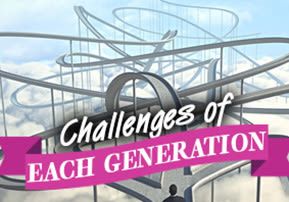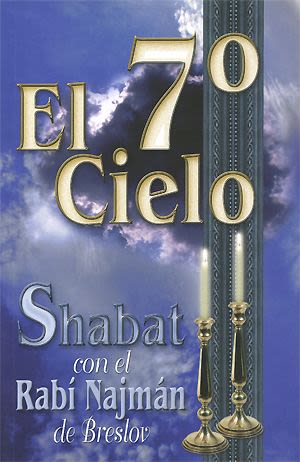
Noach: Challenges of Each Generation
Hashem in His amazing Divine providence decided to plant each individual in each respective generation. Don't say, “We're not good enough”; we too have power...

"…I have seen you to be righteous before Me in this generation." (Genesis 7:1).
Our sages argue whether Noah was an absolute righteous man or whether he was righteous only in relation to his generation. Some argue that if Noah would have been in Abraham's generation, he wouldn't have appeared to be so righteous when compared to Abraham our forefather, the founder of monotheism. Others argue that if Noah would have been in Abraham's generation, he would have been uplifted even higher under the influence of such a magnificent teacher like Abraham, just as Abraham's Canaanite slave Eliezer climbed to lofty spiritual heights under his master's tutelage. Either way, the argument remains academic. Although it's possible to argue either side of the coin, and both opinions stem from holy Tannaic sages whose every word is truth, Hashem in His mind-boggling Divine providence decided to plant each respective individual in each respective generation, giving them the tools to handle the challenges of their particular generation.
Talmudic tradition tells us that any sage who was mentioned in the Gemara was capable of reviving a dead person. We can't fathom the spiritual level of the “Chofetz Chaim”, Rabbi Yisrael Meir HaCohen (Kagan) of Radin, of saintly and blessed memory, who left this physical world a mere 82 years ago at the time of this writing. What can we say about Abaye and Rava, Ula and Rav Kahana, our holy Amoretic  sages whose elaborations on the Mishna make up the Gemara? Do you know what they – the Amoretic sages – said about the generations that preceded them, the Tannaic sages whose teachings comprise the Mishna, the basis of our Oral Law? They said that if the Tannaic sages were angels, then they (the Amoretic sages) are mere humans; yet, if the Tannaic sages were humans, they are donkeys, although beneath the level of a Tanna's donkey, such as the donkey of the holy Tanna Rebbe Pinchas ben Yair that wouldn't eat any forage that was not tithed.
sages whose elaborations on the Mishna make up the Gemara? Do you know what they – the Amoretic sages – said about the generations that preceded them, the Tannaic sages whose teachings comprise the Mishna, the basis of our Oral Law? They said that if the Tannaic sages were angels, then they (the Amoretic sages) are mere humans; yet, if the Tannaic sages were humans, they are donkeys, although beneath the level of a Tanna's donkey, such as the donkey of the holy Tanna Rebbe Pinchas ben Yair that wouldn't eat any forage that was not tithed.
Our sages of the Gemara could not only revive the dead, they had a holy spirit that enabled them to see far into the future. We see in several places in the Gemara where they describe the exact socio-political climate and preconditions of the generation before Moshiach; these descriptions are like reading a Reuters news report on this morning's web. Listening to his colleagues discuss Moshiach, Ula said emphatically, yete velo achimeno – let him come, but I don't want to see him…
How could the holy Ula say such a thing? Why wasn't he eagerly awaiting Moshiach like we all should be? Ula, if I'm not mistaken, saw two things that jolted every fiber of his soul: first, he saw that if the Jewish People fail to return to Hashem in complete teshuva and emuna, then the Babylonian exile of his time and subsequent continued Diaspora would be worsened with inquisitions, expulsions, forced apostasy, constant threats of genocide, crusades, pogroms and holocausts. He didn't want to see any of that. Second, he saw the exact opposite of the physical horrors and atrocities that killed Jewish bodies; he saw iPhones, social media, and chatrooms. He saw what my esteemed friend and leading educator Rabbi Zecharia Wallerstein shlit'a laments about, Beis Yaacov girls text-messaging on Shabbat. He saw “frum” women with heavy makeup, tight and provocative clothing and wigs that reached down to their lumbar vertebrae who looked far worse that the most wanton of his generation's women. He saw “frum” men with porno and drug addictions and he saw teens falling off the path of observant Judaism right and left. He saw unprecedented assimilation. For Ula, this generation of material amenities was worse than any death or destruction of previous generations. Why? During previous generations, Jewish bodies were martyred. In our generation, Jewish souls are being murdered. The latter is by far a greater tragedy, one which Ula wanted no part of.
What does this mean? Don't be upset – quite the contrary. If Hashem decided to bring our souls down to the world in this generation, it means that we have the valiant capabilities to cope with challenges that even the holy Amoraim were afraid of. This is encouraging. Hashem is telling us, “My beloved children, you have the power!” Let's not sell ourselves short. Let's strengthen our resolve to rise to the challenges that the evil inclination throws in our way every single moment. The stakes are high, but so are the rewards. Just imagine – don't give up, take heart and don't be discouraged, and you'll have a front-row seat at Moshiach's coronation, speedily and in our days, amen!









Tell us what you think!
Thank you for your comment!
It will be published after approval by the Editor.